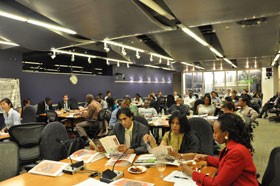Training with the Enemy: How CSOs Are Improving Bank Staff’s Ability to Engage with Civil Society
 Photo: Civil Society Team
Photo: Civil Society Team
While some Bank and CSO staff may have considered each other ‘enemy combatants’ on the proverbial policy battlefield some years back, today many are collaborating in joint training efforts geared to improving relations. In a reversal of roles, a number of policy advocacy CSOs are helping to train the very same Bank staff whom they often advocated against in the past. A good example is the participation of well known CSOs who monitor transparency issues in the extractive industries – Global Witness, Oxfam, and Revenue Watch – in a training session with staff from the Bank’s Oil, Gas, and Mining Department in April 2010. The session was geared to improving the Bank staff’s knowledge and skills to engage civil society, and the CSOs were asked to both diagnose the nature of Bank – CSO tensions and suggest ways to improve these relations. While CSOs highlighted the difficulty they often face to get information or set up meetings with Bank staff, they also noted how the Bank’s presence can actually guarantee the safety of local CSOs. Bank staff, in turn, shared the difficulty they have in identifying the appropriate CSOs to engage with at the country level, and expressed frustration with some of the critique the Bank receives despite their efforts to reach out. They also welcomed greater civil society involvement in Bank-financed extractive industry projects.
Another instance of CSO involvement in training of Bank staff was a series of capacity-building sessions by the Middle East and North Africa (MNA) region, held in January – February 2010. The training course focused on improving the quality of civil society engagement in the MNA region and was one of the initiatives undertaken in response to the Yemeni Inspection Panel Case. The four half-day training sessions were offered to all MNA operational staff based in Washington, and representatives from the Bank Information Center (BIC), World Learning, and the International Trade Union Confederation (ITUC) participated in panel discussions during each the sessions. The CSO representatives provided insight into how they view their role vis-à-vis the Bank, and gave examples of what they think has worked well and not so well in their engagement with the World Bank. Bank staff who participated in the four training sessions gave their highest survey marks for the CSO panels.
Finally, World Learning which is a CSO with decade’s long experience carrying out community-based training worldwide, has been assisting the Bank over the past 5 years to provide training to Bank staff on engaging civil society. They help the Civil Society Team deliver 3 day-long courses “Civil Society: Why and How to Engage Effectively” to Bank staff on why (rationale, theoretical basis) and how (methodology, tools) to engage civil society. The interactive course includes: presentations on the history of Bank – CSO engagement and the Civil Society Consultation Sourcebook; a simulation of a conflictive Bank – CSO consultation meeting; and group work on developing effective engagement strategies within actual Bank projects.
This new found collaboration around training not only defies stereotypes, but is further evidence of how far Bank – CSO relations have evolved in the last 20 years. What these training courses have shown that there is much to be gained by Bank and CSOs exchanging perspectives and experiences in order to improve the effectiveness of their respective engagement efforts. This does not mean that the Bank and CSOs will agree on all issues, but they will at least be able to communicate better and hopefully build greater trust going forward.